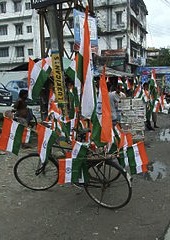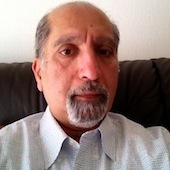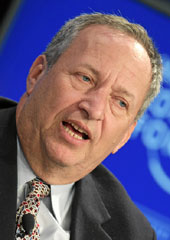Celebrating India’s Independence
After 66 years of independence from colonial rule, what does India have to show for it?
August 14, 2013

Independence Day, for any country, is usually a time for celebration and to reflect on the achievements of the previous years.
Big preparations costing hundreds of millions of dollars are under way all over India to celebrate the nation’s 66th birthday.
What are we Indians celebrating?
Some painful questions need to be asked. They are all the more pertinent as India arrives at two-thirds of an entire century of self-governance.
Shall we celebrate the wholesale violation of the great universal values of democracy and pluralism, as well as of social and economic justice, which the corrupt political and bureaucratic class is committing in India today?
Or should we celebrate the persistent poverty and sub-human conditions of life of 70% of our people?
Perhaps we should celebrate the extraordinarily affluent lifestyles — bordering on vulgarity — of the 2% of our population who control 90% of the wealth in India?
We could also celebrate the inability of half of our population to buy a second meal on any given day while our granaries remain overflowing with rotting grain.
And what of the lack of water, electricity, sanitation, roads, hospitals and schools for a majority of our people?
Forty years ago, we Indians were lucky to get running water for 30 minutes in the morning, and another 30 minutes in the evening. Our “luck” is still holding out today — at those 1970s levels.
We Indians also have reason to celebrate proudly the power of our police and security forces — for their indulgence in arbitrary arrests and torture.
They eliminate undesirables by staging incidents. Their word is law and most times we never really know where some people disappear.
Alternatively, we could celebrate the fact that tens of thousands of people all over India remain in police lockups for years without any formal charges being brought against them.
When charges are finally brought, the judiciary also gets a laudable opportunity to display its “efficiency.” It does so mainly by sometimes actually delivering justice during the lifetime of the victims!
The rest, who have in the meantime departed this earth, do get the right to appeal directly to a “higher court.”
We shall also celebrate our reputation as one of the most corrupt countries in the world. Our politicians are true believers in free enterprise. Their enterprising spirit manifests itself in new and exciting forms of profiteering and racketeering.
It’s free market competition — even the most successful and dynamic of our business entrepreneurs and industrialists can’t compete with the brilliance of our politicians in making loads of money, with no personal investment.
Political science teaches that the “state” is sovereign. In India, politicians, especially those in power, claim sovereignty for themselves.
Their actions, decisions and fiats are unquestionable and unstoppable. They are not accountable to anybody.
Independence Day gives us the opportunity to celebrate our politicians’ exalted sense of self-importance, their inflated egos and unmatched arrogance.
Their sense of entitlement to act with impunity puts to shame the divine right of kings — the theory by which England’s monarchs claimed the right to rule, as God’s chosen leader, during the Middle Ages.
Drunk on absolute power, India’s politicians claim freedom from arrest. They further claim the privilege to remain in their parliamentary seats even if convicted of serious crimes.
Recently, a young 28-year old Indian Administrative Services officer was suspended for exposing crimes by a powerful local politician in India’s largest state.
There is also the case of Ashok Khemka, a senior IAS officer who has been transferred 45 times in the last 20 years for exposing politicians’ crimes and corruption.
These are both testimonies to the absolute power in the hands of Indian politicians.
They never hesitate to use these powers. This results in immense pressure on honest officials to not even think of crossing the “pols.”
Mr. Khemka was recently transferred most recently for exposing the numerous wrongdoings of Robert Vadra — the son-in-law of the late Prime Minister Rajiv Gandhi and the ruling Congress Party’s Chairwoman, Sonia Gandhi. The crimes run into the hundreds of millions of dollars.
And so we will merrily celebrate freedom from the British — but not freedom from hunger, illiteracy, disease, bureaucratic tyranny, hollow words or empty promises. We will be celebrating 66 years of our right to choose our own oppressors.
We will also celebrate our right to elect criminals to loot and kill our own people. Of course, our elected representatives have proved beyond doubt that they are better than the British, our erstwhile masters, in the dangerous game of divide and rule.
Our leaders also outperform colonial authorities in appropriating to themselves unlimited power and wealth and in the ability to stay in power from cradle to grave.
In all probability, 2014 may well bring the 4th generation of democratic India’s “royal family” — the Nehru-Gandhis — to power. The latest heir apparent is poised to claim the “throne” held before him by his father, grandmother and great-grandfather, like some English king of old.
Sixty-six years ago, we made a “tryst with destiny.” We exchanged a set of foreign rulers for the homegrown variety.
We replaced the British whose self-proclaimed mission in India was to civilize, with the Indian politician whose mission is personal aggrandizement.
We Indians exchanged efficient and results-oriented British administration for maladministration, and governance for inertia.
Painful as it may be to our national pride, we replaced able foreign administrators for Indian criminals. We exchanged foreign masters who would come and go for indigenous goons who go on and on.
For most Indians there is little to celebrate and hardly anything to look forward to. But our politicians will be celebrating Independence Day again in a big way. As inheritors of India from the British, they are the ones who received the “estate.”
But they also appropriated far greater power and control over finances and state machinery—unfettered by accountability and responsibility—than the British could ever manage.
Lastly, we shall celebrate the fact that no senior Indian politician has ever been convicted for his crimes in a court of law.
Let us congratulate the thousands of our politicians—both, those in power and those temporarily out—and their families, hangers-on and sycophants for whom independence has a meaning.
For the rest, the overwhelming majority of Indians, a life of dignity and real independence is still a dream.
Takeaways
India celebrates freedom from the British, but not freedom from hunger, illiteracy, disease or bureaucracy.
Indian representatives are better than the British in the dangerous game of divide and rule.
2014 may well bring the 4th generation of democratic India's "royal family" to power.
Sixty-six years ago, Indians exchanged a set of foreign rulers for the homegrown variety.
We exchanged the efficient and results-oriented British for maladministration, and governance for inertia.
Painful as it may be to Indian pride, we replaced able foreign administrators for Indian criminals.

